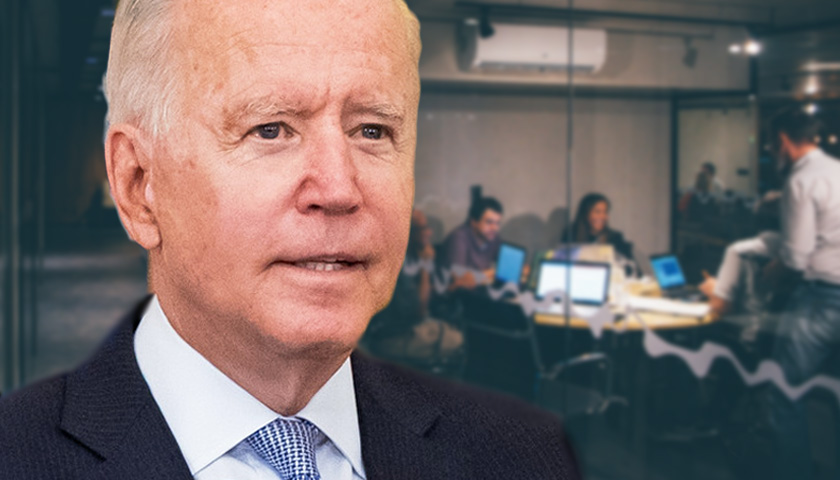by Josh Hammer
As Joe Biden launches via executive order a sweeping vaccine mandate for all federal government workers, and now a brand-new initiative for private-sector mandates, the issue has once again risen to the forefront of the national dialogue.
United Airlines, for example, recently became the first U.S. airline to mandate COVID-19 vaccination for all its employees. United Airlines’ mandate takes effect on September 27, and it might augur a broader trend: A poll conducted last month by insurance and advisory firm Willis Towers Watson, for example, suggests that 52 percent of private-sector employers surveyed expect to have a workplace vaccine mandate by the end of 2021. As Biden’s brand-new announcement of a Department of Labor rule for private sector vaccination requirements now makes clear, that poll was prescient.
Against this backdrop, several Republican-leaning states have advanced laws or executive orders that prohibit private sector vaccine mandates for employees, customers, or in some other respect. That tally is now at least eight states: Arizona, Arkansas, Florida, Idaho, Montana, Texas, South Carolina, and South Dakota. The legal mechanics and specifics differ from state to state. But the highest-profile and most mechanically straightforward Republican-led assault on vaccine mandates is the one in my new home state, Florida.
In May, Florida Governor Ron DeSantis, a talismanic figure of sorts for those standing athwart COVID-induced hysteria, signed into law SB 2006. The legislation bans private businesses, local governments, and schools from issuing vaccine mandates for customers or members of the public. On August 27, Florida’s Department of Health announced that it would enforce SB 2006 through $5,000 fines “per individual and separate violation.” That rule will go into effect on September 16, though DeSantis had already taken aim at mandatory private-sector vaccinations with an executive order before the passage of SB 2006.
Amid the pending Department of Labor vaccination rule for all employers with 100 or more employees, there will now inevitably be mass litigation between the states and the federal government. As that litigation begins to percolate, the battle lines are clarified.
Progressives, whose various echo chambers have led them to believe COVID is a modern-day apocalypse despite a 98 to 99 percent (at least) survival rate, predictably march in lockstep against bans on vaccine mandates. It is perhaps the only time progressives defend private enterprise against public regulation, broadly speaking. But the Right is divided over the question of what role, if any, the state should play in regulating private sector vaccine mandate promulgation and enforcement.
The private sector vaccine mandate, much like the roiling debates over Big Tech regulation, is a proxy for a broader intellectual fault line on the Right. That divide is between the more adamantly classical liberal, libertarian-inspired belief that the quintessence of sound governance is simply permitting individuals and private entities to do what they wish, and the more common good-inspired belief that the breadth and depth of the threat from our woke ruling class is such that we must be less skittish about the prudential use of state power to secure the deplorables’ basic way of life.
On this matter, as in many other matters, the DeSantis-style common-good conservatives have the better of the doctrinaire “let businesses do whatever they want” libertarian absolutists. It is important to understand why.
President Ronald Reagan once said, “The nine most terrifying words in the English language are, ‘I’m from the government, and I’m here to help.’” That was probably true when the Gipper said it, but times have changed. The new, 21st-century threat comes in the form of a sprawling, paninstitutional ruling class whose public and private sector branches alike worship at the secular altar of wokeism. That ruling class has no interest in abiding by any sort of neutral “live and let live” niceties; its interest is in banning conservative speech from social media, soft-banning conservative ideas from the academy by means of “microaggressions” and “safe spaces,” and so on. As I have argued, we should think of the new “most terrifying words” as, “I’m from the ruling class, and I’m here to subjugate you.”
Vaccine mandates will be a convenient fig leaf for a ruling class already gung ho at the possibility of precluding conservatives from the full panoply of in-person public life: air travel, concerts or even private banking services. Accordingly, the governing imperative is to use state power to protect those who may harbor not-unreasonable reservations about the COVID vaccines against woke capital and woke businesses champing at the bit to forsake those who have made a different decision about what to do with their bodies than what our elites may wish.
Dispensations will always be made, but the default legal rule should be a general ban on private sector vaccine mandates. Those still very concerned about COVID, after all, can always vaccinate themselves: The vaccines presumably work well, as we are constantly told.
It is the obligation of patriots in 2021, to quote Claremont Institute Senior Fellow David Reaboi, to “know what time it is.” On vaccine mandates, that means following the DeSantis lead, and, as now appears to be necessary, launching strategic state-led lawsuits against an overzealous Biden Administration dead-set on making COVID hysteria the law of the land.
– – –
Josh Hammer is the opinion editor of Newsweek. A popular conservative commentator, he is a research fellow with the Edmund Burke Foundation and a syndicated columnist through Creators. A frequent pundit and essayist on political, legal, and cultural issues, Hammer is a constitutional attorney by training. He is a former John Marshall Fellow with the Claremont Institute and a campus speaker through Intercollegiate Studies Institute, Young America’s Foundation, and the Federalist Society.








